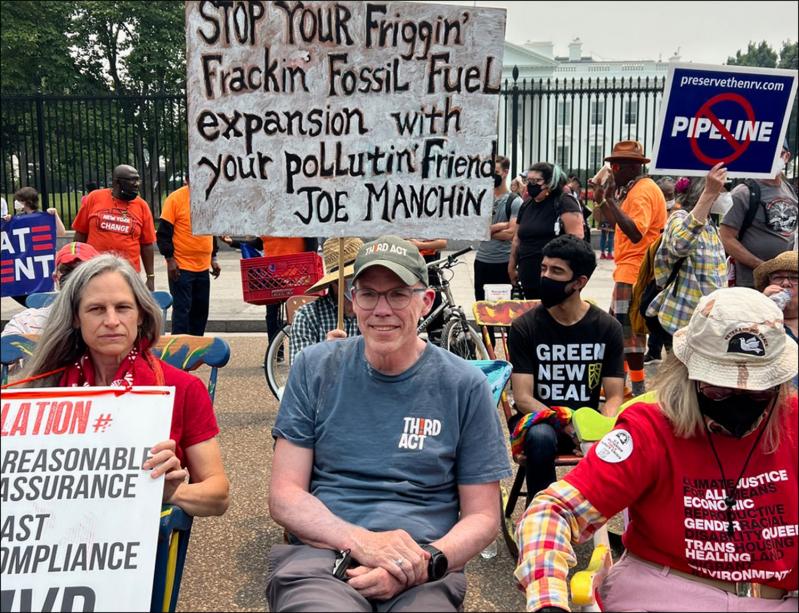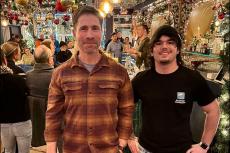The hour is late, but it is not yet too late, argues Bill McKibben, the writer, activist, and environmentalist.
“I think we’re at a very, very difficult and dangerous place with climate change,” Mr. McKibben told The Star on Tuesday, as President Trump ranted, at the United Nations headquarters in Manhattan, that countries pursuing the “green energy scam” are destined to fail.
“Under Trump,” Mr. McKibben said, “the United States has apparently decided that we’re going to try and squeeze the last drops of profit out of 19th-century technology and forget about the future.” But the future is now, in the form of what he said is “the fastest energy transition in history, by far.”
In the past two years, solar energy has become the most cost-efficient energy choice around the world, and in a Sept. 13 post on his Substack newsletter, The Crucial Years, Mr. McKibben details this global transformation. Chinese companies, he noted, have pledged at least $227 billion in green manufacturing projects, an investment that surpasses that of the American post-World War II Marshall Plan to rebuild Europe, “a key driver of what became the most prosperous economy the world has ever seen.”
The unmistakable trend is this “rapid spread of clean energy and its associated appliances, not only in China but in all the countries increasingly in their sphere,” he said. The United States, by contrast, is on a course to become “the Colonial Williamsburg of internal combustion.”
Mr. McKibben, the author of “Here Comes the Sun: A Last Chance for the Climate and a Fresh Chance for Civilization,” published last month, will speak on Sunday at 4 p.m. at Guild Hall in East Hampton, presented with the Peter Matthiessen Center. His talk will be followed by a conversation with Alex Matthiessen, the Matthiessen Center’s president.
A staff writer at The New Yorker and the author of a dozen books, Mr. McKibben was among the first to sound the alarm about climate change with “The End of Nature,” published in 1989. He founded Third Act, a climate and democracy advocacy group for people over 60, and is co-founder of the climate activist group 350.org, its name referring to the concentration, in parts per million, of carbon dioxide in the atmosphere that is considered the threshold to avoid catastrophic climate change. (Atmospheric CO2 levels were around 430 parts per million and rising as of mid-2025, according to the National Oceanic and Atmospheric Administration.)
“All the things we said would happen are happening, and more,” he said of the conclusions posited in “The End of Nature.” “There’s parts of the story we didn’t completely understand or anticipate, even then. . . . The breakdown in basic physical systems of the planet, especially the jet stream and Gulf Stream, have caught my attention in the last six months. I’m very glad that we finally have one scalable tool to take on climate change.”
Climate change is primarily caused by the burning of fossil fuels, “so until we had something that can affordably replace fossil fuels, it was going to be very hard to do anything about climate change,” he said. “It’s still going to be very hard because there’s a lot of inertia and vested interest in the way, but now there’s really no big technical or financial obstacle that would prevent the planet from rescuing itself, if we wanted to. We can’t stop global warming — it’s too late for that — but we may still be able to stop it short of the place that it cuts civilization off at the knees.”
After a few false starts — President Carter funded and promoted solar energy research, his successor drastically cut that funding — “the Chinese have been getting better and better and better at building this stuff,” Mr. McKibben said. “Every time we double the solar capacity in the world, every time we double the amount of solar installed, the price goes down by half because we get better at it. About five years ago, we crossed an invisible line where it became clearly cheaper to produce power by pointing a sheet of glass at the sun or capturing the breeze than to burn coal, gas, and oil.”
The world, he said, produced one-third more power from the sun in the summer of 2025 than in the previous summer. “The Chinese have decided that this is their ticket to technological and economic primacy,” Mr. McKibben said, “and with that, quite likely some kind of political leadership around the world as well.” China will own this transition, he said, “unless we really change fast.” President Biden tried to effect that change with the Inflation Reduction Act of 2022, he said. “But the problem was that it posed a deep threat to the fossil fuel industry.”
The current president, he noted, reportedly asked fossil fuel executives to raise $1 billion for him during last year’s presidential campaign, promising in return a rollback of environmental regulations and climate policies. “They gave him about half, between donations, advertising, and lobbying,” Mr. McKibben said. “That turned out to be enough. He’s giving them everything they ever asked for, including insane things like trying to shut down nearly finished wind farms off the Atlantic Seaboard. Clearly, the only goal is to slow this energy transition.” But, he said, “I think they can’t stop it around the globe, and don’t think they can really stop it in America. . . . But they can definitely slow things down at the moment when we can least afford it.”
Frustrated at the federal level, “we are going to push as hard as we can at the state and local level to make it much cheaper to put solar on roofs and balconies of apartments,” Mr. McKibben said. “We need Albany pushing much harder. So far, Gov. [Kathy] Hochul has been her usual super-lukewarm, deeply compromised self about all this, but I’m glad to see the lieutenant governor [Antonio Delgado] really pushing hard for change. . . . If California and Texas are able to do it, there’s no reason New York should not be able to follow.”
Thirty years from now, he said, “we will run the planet on sun and wind just because of economics, but if it takes us 30 years, the planet we run on sun and wind will be a broken planet. So we have to speed up.”
Sunday was Sun Day, a 500-event-strong, nationwide day of action organized by groups including 350.org and Third Act to celebrate and advocate for clean energy. “Thank you,” Mr. McKibben wrote that day on The Crucial Years, “for being part of this beautiful, sad, necessary fight.”
Tickets for “The Matthiessen Talks: Bill McKibben, a Last Chance for the Climate and a Fresh Chance for Civilization” are $25, $22 for members, and available at the box office today through Sunday from noon to 5 p.m., and at guildhall.org.




